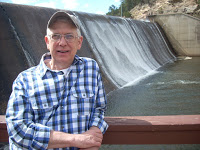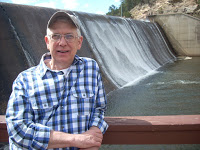I hate capitalized words in philosophy and theology. It’s okay if those words stand at the beginning of a sentence, but even then, if it’s a word like evil or truth, I get the jitters. The problem for me goes way back to the days I was paying attention to philosophical matters related to religion. In my early twenties I came to appreciate my childhood and teen years because in church we never said what was called “The Lord’s Prayer.” We knew it because it was in the Bible, but that prayer was not said in unison as an element of weekly liturgy. I grew up in a “free church” tradition congregation. There were no liturgical prayers except a benediction song, “God be with you ’til we meet again.” Our prayers were spontaneous improvisations related to the moment.
At age 22 I took a job in an urban church that met in a modified Gothic building with medieval-looking art glass windows and aped liturgical tradition although it taught the same Free Church approach as the church of my upbringing. Because of my studies I was especially sensitive over the weekly repetition of the Lord’s Prayer, knowing it was archaic and a bad translation. In short, I did not grow up saying weekly what most Christians said, “Lead us not into temptation, but deliver us from evil.” I knew evil should be translated the evil one, that mythological ascription to the devil or Satan. I was not interested in such myths and fears. I had never dreamed of such a being and have still not done so. I knew there were enough real moral challenges that dwelt in me as well as in social life. I wasn’t attracted to reifying ancient language as if it were scientific. I felt I was lucky while at the same time I worked to examine the educational effects of weekly saying something one didn’t believe. No wonder people who grew up in those old-fashioned liturgical churches often rejected them. No wonder some of them claimed that religion was itself the origin of all evil in the world.
I knew unhealthy activities made up a part of my life. I knew that I was much less than perfect. I also knew perfection wasn’t my goal in life. I simply wanted to live in relationship with many people from all walks of life (to the extent that I understood life at such an early age). I wasn’t judgmental about their decisions and was more interested in my goals than in my disappointments. Also I was not interested to blame my foibles on some external power in the universe. I accepted that all persons, all organizations, all best intentions were also subject to being imperfect, that all visions of perfection were imperfect and ultimately unattainable. I focused on the ethical tradition “Do unto others as you would have them do unto you.” That seemed enough to me. And it still seems adequate. I do sometimes say a quiet prayer silently. Deliver me from mistaken images of evil that will invite me to pound a wedge between me and the vast world of difference such as difference of race, nationality, values, hopes, dreams, commitments, and so much more. I have too much fun meeting life as it presents itself and too little time to fret over my own or another’s evil. I do hope to love my enemies, to serve my communities in hopes of building better opportunities for all people. I do hope for a better world. But deliver me from evil? Too metaphysical for me.
© 26 June 2017
About the Author
Phillip Hoyle lives in Denver and spends his time writing, painting, and socializing. In general he keeps busy with groups of writers and artists. Following thirty-two years in church work and fifteen in a therapeutic massage practice, he now focuses on creating beauty. He volunteers at The Center leading the SAGE program “Telling Your Story.”
He also blogs at artandmorebyphilhoyle.blogspot.com

